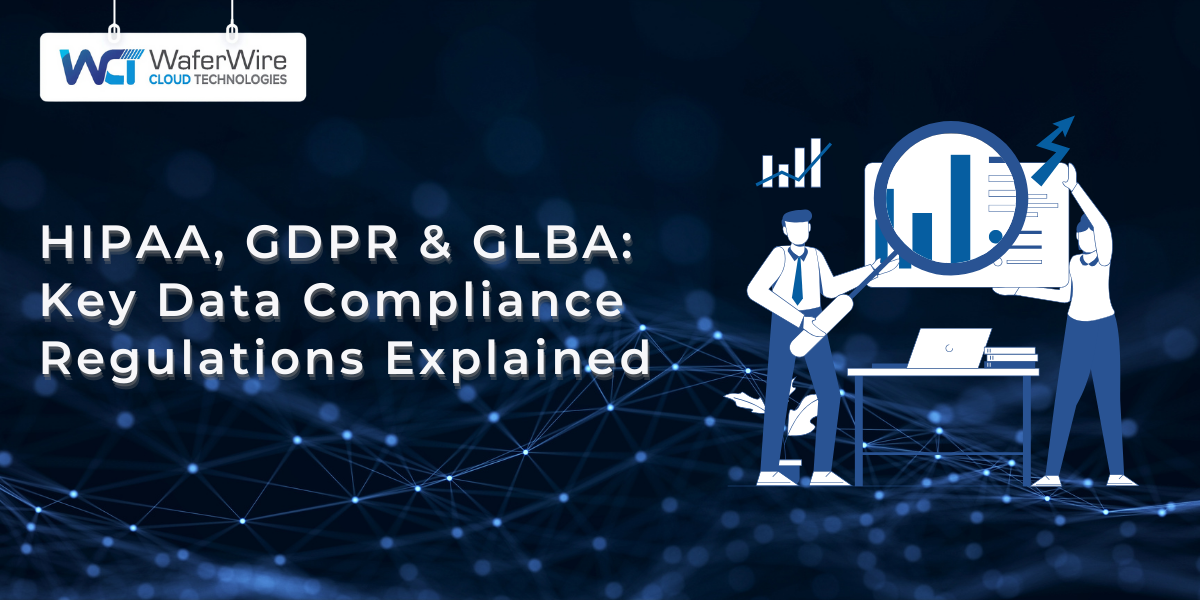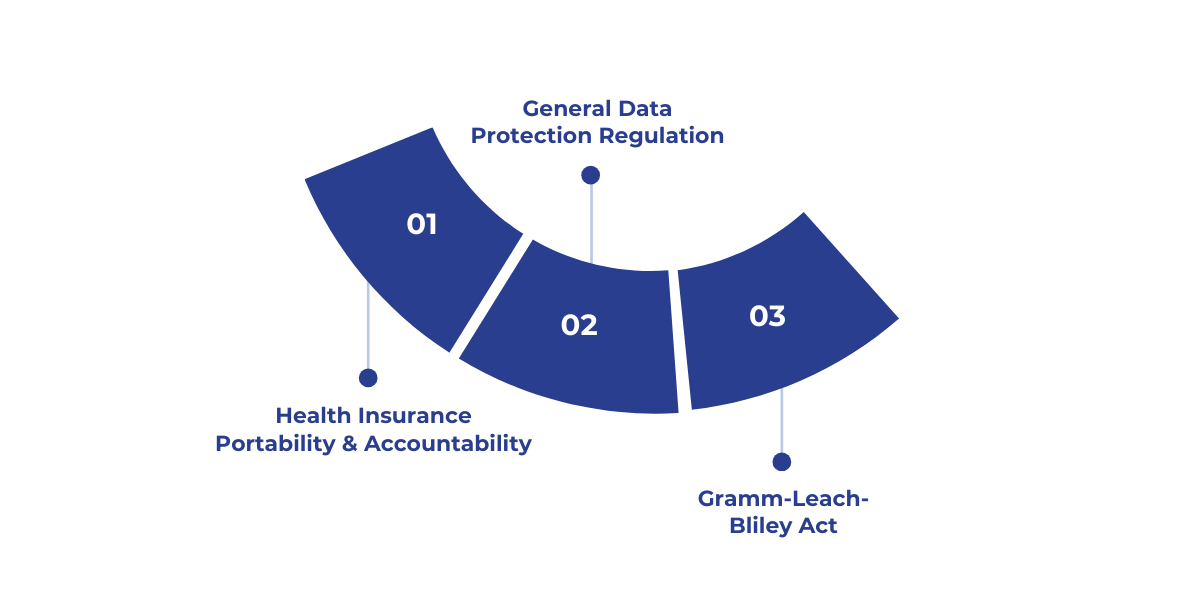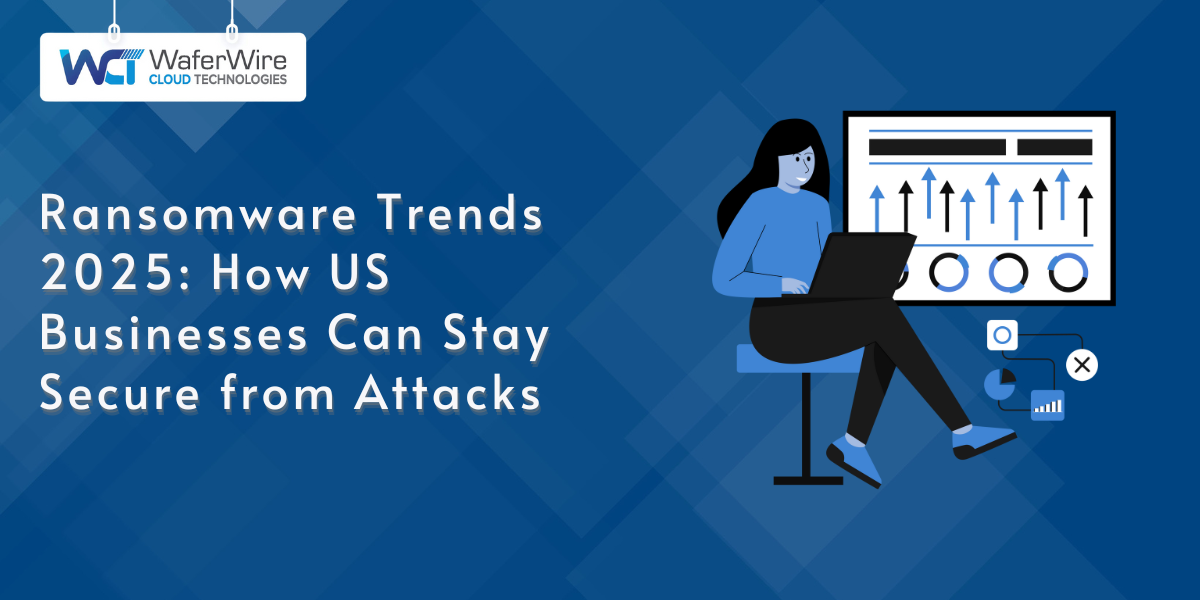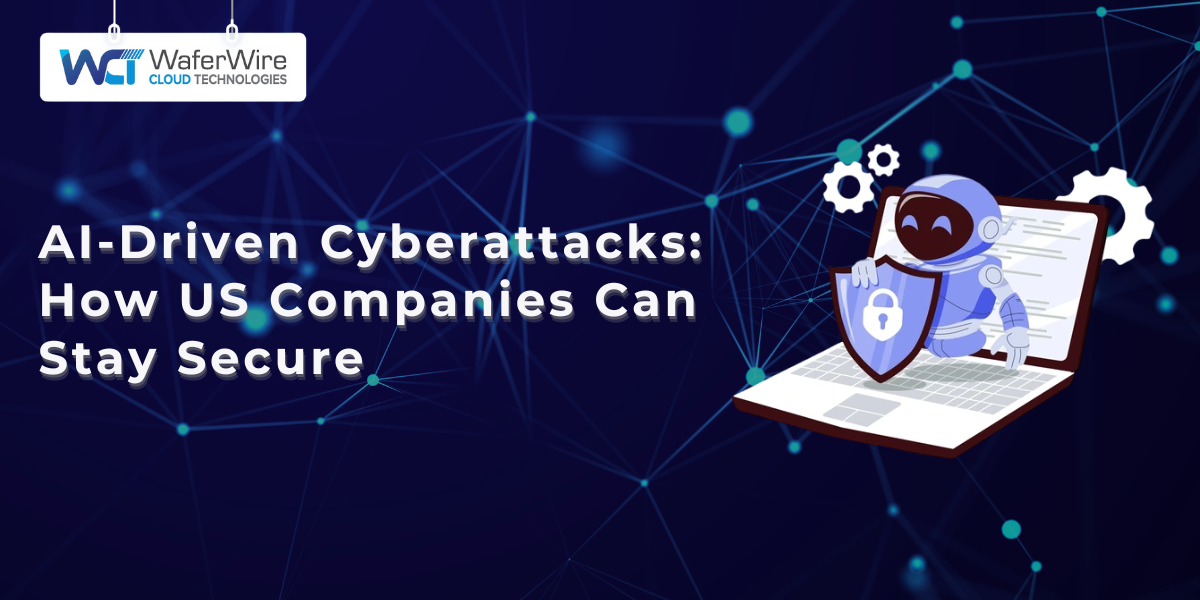
HIPAA, GDPR & GLBA: Key Data Compliance Regulations Explained
Sai P
8th Sept 2025

Talk to our cloud experts
Subject tags
Wondering how well your business is protecting sensitive data? With data breaches on the rise, adhering to regulations like HIPAA, GDPR, and GLBA is essential. These laws govern health, personal, and financial data, and non-compliance can result in hefty fines and reputational damage.
In this article, we break down each regulation, namely HIPAA, GDPR, and GLBA. Outlining their key requirements, penalties for non-compliance, and actionable steps businesses can take to stay compliant and secure.
Key Takeaways:
- GDPR focuses on protecting personal data of EU residents, with strict consent and data rights requirements.
- HIPAA protects health data in the U.S. healthcare industry, enforcing privacy and security measures for PHI.
- GLBA mandates data protection for financial institutions in the U.S., with safeguards and privacy disclosures for financial data.
- Non-compliance with GDPR can lead to fines of up to €20 million or 4% of global turnover, while HIPAA violations can cost up to $1.5 million annually.
- Best practices for compliance include regular risk assessments, strong data security measures, employee training, and clear documentation.
Understanding HIPAA, GDPR, and GLBA Regulations

Each of these regulations addresses different types of sensitive data. HIPAA focuses on the healthcare industry in the U.S., GDPR protects personal data of EU citizens, and GLBA is concerned with safeguarding financial information. Below are the critical aspects of each regulation.
1. HIPAA (Health Insurance Portability and Accountability Act)
HIPAA is primarily concerned with protecting the privacy and security of health information in the U.S.
It mandates that healthcare organizations ensure proper handling of Protected Health Information (PHI), including its storage, processing, and sharing.
Who Should Comply with HIPAA?
- Covered Entities: Healthcare providers (hospitals, doctors, etc.), health plans (insurance companies), and healthcare clearinghouses (organizations that process health data).
- Business Associates: Third-party vendors who handle or process PHI on behalf of covered entities, such as IT providers, billing companies, and cloud storage services.
Consequences of Non-Compliance
HIPAA violations can result in significant financial penalties, depending on the severity of the violation. Fines can range from $100 to $1.5 million annually, with more severe penalties for willful neglect or intentional violations.
In addition to financial penalties, non-compliance can lead to legal actions, loss of business, and reputational damage.
Key Compliance Areas:
- Privacy Rule: Establishes how PHI is to be accessed, shared, and disclosed, with a focus on ensuring patients' privacy.
- Security Rule: Requires healthcare organizations to implement technical and physical safeguards to protect electronic PHI (ePHI) from unauthorized access or breaches.
- Breach Notification Rule: Mandates that covered entities notify affected individuals and HHS of any breach of unsecured PHI, ensuring transparency and accountability.
Enforcement and Penalties:
HIPAA compliance is overseen by the Department of Health and Human Services (HHS). Failure to comply can result in severe penalties, with fines based on the level of negligence.
2. GDPR (General Data Protection Regulation)
The General Data Protection Regulation (GDPR) is a robust data protection law that safeguards the personal data of individuals within the European Union (EU).
It applies not only to EU-based businesses but also to any organization globally that processes the personal data of EU residents.
GDPR empowers individuals with greater control over their data and sets strict guidelines on how businesses collect, store, and share personal information.
Key compliance requirements include:
- Right to Access: Request access to their personal data.
- Right to Rectification: Correct inaccurate data.
- Right to Erasure: Request deletion of data ("Right to be Forgotten").
- Right to Data Portability: Transfer data to another service provider.
Penalties for Non-Compliance:
GDPR imposes significant fines for non-compliance, with penalties based on violation severity:
In 2024, the average cost for GDPR compliance varied significantly:
3. GLBA (Gramm-Leach-Bliley Act)
GLBA is a U.S. federal law designed to protect consumers' financial information. It applies to financial institutions and requires them to establish safeguards for data protection.
GLBA mandates the implementation of the Safeguards Rule and the Financial Privacy Rule to ensure that consumer financial data is handled securely.
Compliance Requirements:
- Safeguards Rule: Institutions must develop comprehensive data security programs, conduct periodic risk assessments, and train employees on data protection.
- Financial Privacy Rule: Requires institutions to disclose how consumer financial data is used and shared, and provide an opt-out option for consumers.
Penalties:
Comparing HIPAA, GDPR, and GLBA: Key Differences and Similarities
These regulations govern different types of sensitive data but share common goals of protecting privacy, ensuring data security, and enforcing breach notification protocols. Below is a comparison of their key features and penalties for non-compliance:
With these regulations in mind, it’s crucial to follow best practices to ensure your business remains compliant and secure.
Best Practices for Achieving Compliance

Achieving compliance with HIPAA, GDPR, and GLBA is critical for businesses handling sensitive data. Below are specific best practices to help ensure compliance and mitigate risks:
1. Regular Risk Assessments
Continuously evaluate and address potential vulnerabilities in IT systems through regular risk assessments, penetration testing, and system audits. Adjust security measures based on emerging threats, such as new ransomware attacks or evolving phishing tactics.
2. Strong Data Security
Use a multi-layered approach to data protection:
- Access Controls: Restrict access to sensitive data based on roles and responsibilities.
- Encryption: Encrypt sensitive data both in storage and during transmission to prevent unauthorized access.
- Physical Security: Secure servers, workstations, and physical data storage to prevent unauthorized physical access.
3. Employee Training
Conduct ongoing training sessions to ensure employees are aware of their responsibilities under data protection laws. Train staff to recognize phishing, social engineering tactics, and the importance of protecting sensitive data in their daily tasks.
4. Clear Documentation
Keep detailed records of data security policies, incident response plans, and audit results. Ensure breach notification procedures are well-defined and that the organization is prepared to report incidents to authorities within required timeframes.
Conclusion
Compliance with HIPAA, GDPR, and GLBA is crucial for businesses to protect sensitive data, avoid penalties, and foster trust. By adopting best practices like regular risk assessments, robust security, employee training, and clear documentation, businesses can effectively manage compliance.
For businesses seeking to simplify compliance and enhance data security, WaferWire offers tailored solutions in cloud services, AI, and analytics. Contact us today to learn how we can help you safeguard your data and stay compliant.
FAQs
Q: Can a business in the U.S. be fined under GDPR?
A: Yes, even U.S.-based businesses can be fined under GDPR if they process personal data of EU residents. This applies to any company that targets EU customers, regardless of their physical location. The fine can be up to €20 million or 4% of global turnover, whichever is higher.
Q: What are the key requirements for a Business Associate Agreement (BAA) under HIPAA?
A: A BAA under HIPAA must outline how a third-party vendor will protect Protected Health Information (PHI), including security measures, breach notification, and compliance responsibilities. It also requires the vendor to report any PHI breaches and adhere to HIPAA’s privacy and security standards.
Q: How do GDPR's "Right to be Forgotten" and HIPAA's data retention policies differ?
A: GDPR’s "Right to be Forgotten" allows individuals to request deletion of their personal data, while HIPAA has strict retention policies, requiring healthcare entities to keep PHI for at least six years after the last use. HIPAA’s retention policies prioritize maintaining access for legal or business reasons.
Q: Does GLBA apply to fintech companies?
A: Yes, GLBA applies to fintech companies handling consumer financial data. It mandates data protection safeguards and requires clear privacy notices, even for non-bank financial institutions like investment firms. These companies must also provide opt-out provisions for sharing data with non-affiliated third parties.
Q: How can businesses ensure ongoing GDPR compliance without overhauling their systems?
A: Businesses can maintain GDPR compliance through regular audits, staff training, and by integrating privacy by design into their existing processes, avoiding the need for major system overhauls. Adopting automated compliance tools and conducting periodic reviews will also help streamline ongoing compliance efforts.
Subscribe to Our Newsletter
Get instant updates in your email without missing any news

Copyright © 2025 WaferWire Cloud Technologies




.png)













